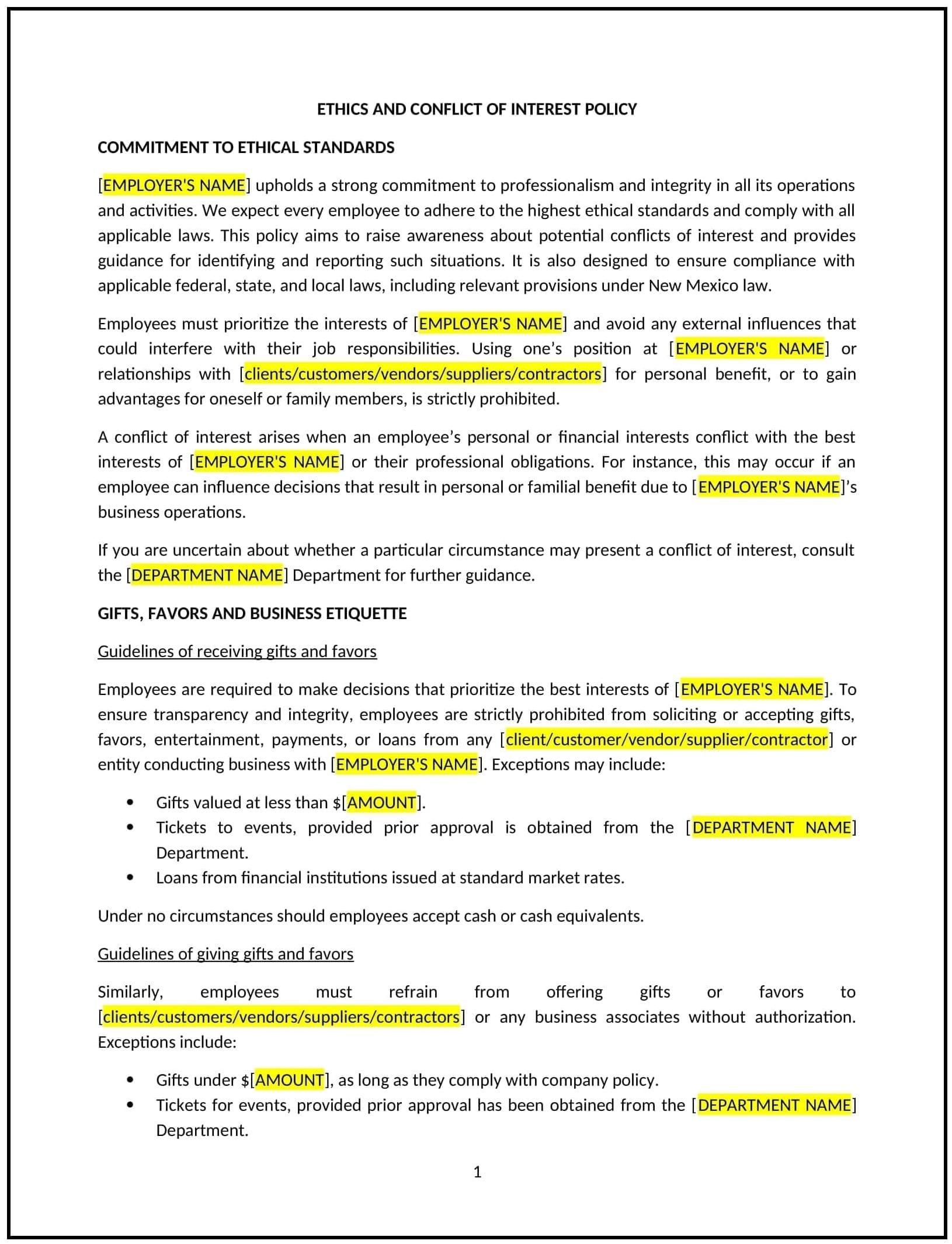Ethics and conflict of interest policy (New Mexico): Free template
Got contracts to review? While you're here for policies, let Cobrief make contract review effortless—start your free review now.

Customize this template for free
Ethics and conflict of interest policy (New Mexico)
This ethics and conflict of interest policy is designed to help New Mexico businesses maintain a high standard of integrity and transparency in all business activities. It outlines the principles and procedures for identifying and addressing potential conflicts of interest, ensuring that employees make decisions based on the best interests of the company, rather than personal gain.
By adopting this policy, New Mexico businesses can safeguard their reputation, foster a culture of ethical behavior, and prevent situations that could lead to conflicts of interest or unethical conduct.
How to use this ethics and conflict of interest policy (New Mexico)
- Define conflicts of interest: Clearly define what constitutes a conflict of interest in the context of the business, such as situations where personal, financial, or family interests may influence an employee’s judgment or actions.
- Establish disclosure requirements: Specify that employees must disclose any potential conflicts of interest to management or HR, including financial interests, relationships with competitors, or outside employment.
- Set procedures for managing conflicts: Outline the steps the company will take to address conflicts of interest, such as reassignment of duties, divestment of conflicting interests, or other corrective actions.
- Provide examples of potential conflicts: Include examples of potential conflicts of interest that employees might encounter, such as accepting gifts from vendors, working with close family members, or participating in activities that compete with the business.
- Reflect New Mexico-specific considerations: Consider any state laws or regulations in New Mexico that may apply to conflicts of interest, including rules for government contractors or specific industries. Tailor the policy to the company’s business activities and the regulatory environment in New Mexico.
Benefits of using this ethics and conflict of interest policy (New Mexico)
Implementing this policy provides New Mexico businesses with several advantages:
- Promotes ethical decision-making: Clear guidelines help employees make decisions that align with the company’s values and long-term goals, minimizing the risk of unethical behavior.
- Protects the company’s reputation: By managing conflicts of interest effectively, businesses can avoid situations that may damage their reputation or lead to legal challenges.
- Fosters trust with stakeholders: A transparent policy builds trust with customers, partners, and investors, showing that the company is committed to ethical practices.
- Reduces legal risks: Addressing conflicts of interest early reduces the likelihood of violations of state or federal laws, protecting the company from potential legal issues.
- Encourages a fair work environment: Employees will feel more confident that decisions are being made based on merit and fairness, not personal interests, contributing to a positive workplace culture.
Tips for using this ethics and conflict of interest policy (New Mexico)
- Communicate the policy clearly: Ensure that all employees are aware of the ethics and conflict of interest policy, including its importance and how to report potential conflicts. The policy should be included in the employee handbook and communicated regularly through training sessions.
- Encourage transparency: Employees should feel comfortable disclosing potential conflicts without fear of retaliation. The policy should emphasize the importance of transparency and ethical conduct in all business dealings.
- Regularly review conflicts: Establish a process for reviewing and addressing disclosed conflicts of interest, ensuring that conflicts are managed in a timely and effective manner.
- Provide training: Regularly train employees on how to recognize potential conflicts of interest and how to handle situations where personal interests might conflict with business interests.
- Monitor compliance: Managers should actively monitor for signs of potential conflicts of interest and ensure that the policy is being followed. This can include periodic checks or audits, particularly in areas where conflicts are more likely to arise.